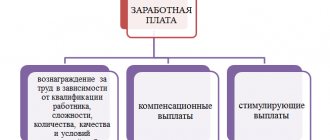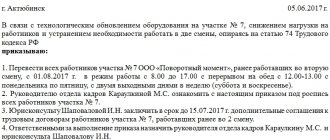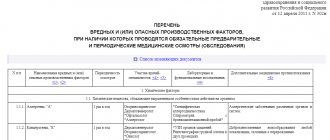Employer's rights
The list of employer rights contains the norms of his behavior with employees. They can be divided into three groups according to the type of relationship:
- employer and individual employee;
- employer and workforce;
- between different employers.
In relation to a specific employee, the employer can:
- hire and fire by concluding and terminating employment contracts;
- demand from hired persons compliance with discipline, performance of duties in accordance with the employment contract and careful attitude towards material assets;
- encourage employees by any means (material and moral) for conscientious performance of duties;
- apply penalties to violators in material terms or in a disciplinary manner.
In relation to the team, the employer has the right:
- conclude collective agreements bilaterally;
- adopt collective acts of local significance;
- organize collective bargaining;
- create works councils;
- carry out an assessment of the conditions that exist at work places.
Expert opinion
Orlov Denis Ignatievich
Lawyer with 6 years of experience. Specialization: family law. Has experience in drafting contracts.
Rights are also defined that relate to relationships between employers, and consist of the provided opportunity to create or represent in associations of employers to protect their interests.
Almost every paragraph of Article 22 defines restrictions on the rights of the employer within the framework of the labor code or other laws at the federal level.
Let's sum it up
- The employer bears material and civil liability directly to the employee. The manager, but not the organization itself, can be brought to disciplinary liability for violating the rights of employees.
- Liability arises when damage is caused and compensation is made by agreement of the parties.
- Civil liability arises by court decision and involves compensation for losses and moral damage.
If you find an error, please select a piece of text and press Ctrl+Enter.
Employer Responsibilities
All responsibilities can be divided into three groups, namely, those that relate to individual employees, work collectives and government bodies.
In relation to the state, the employer is obliged:
- comply with legal labor standards;
- comply with the instructions of federal regulatory authorities that monitor compliance with labor laws.
Responsibilities to the workforce and individuals are as follows:
- provide work, as well as everything necessary for its implementation;
- pay wages on time and in full, observing the principle of equal pay for work of equal value, as well as provide social insurance for each employee;
- organize conditions for labor protection at the level of state standards, as well as pay compensation to employees for damage to health within the framework of legislative acts;
- sign collective agreements regulating labor relations in the team;
- familiarize employees with local acts (orders, regulations, rules, etc.) against signature;
- involve workers in participation in management, including the protection of their interests within the framework of labor legislation.
For violation of these duties, various types of punishment are provided in the form of fines, dismissal from office and prohibition from working as a manager.
How can an employer influence employee behavior?
By requiring an employee to fulfill all the rules established specifically for him (job functions) and for the entire team (internal labor regulations, labor protection requirements), the employer has the right to:
- encourage him for a responsible attitude towards his duties or for some special achievements in work;
- punish for violations.
Encouragement can be expressed in different forms (Article 191 of the Labor Code of the Russian Federation). For example, in the form:
- gratitude;
- diplomas;
- awards;
- gift;
- incentive payments.
The use of incentives can have either a systematic form, based on an internal regulatory act, or a one-time form, determined by individual orders of the manager.
Punishments are a consequence of violations:
- disciplinary nature, in which disciplinary liability occurs (Article 192 of the Labor Code of the Russian Federation);
- associated with causing damage to the employer and entailing financial liability (Chapter 39 of the Labor Code of the Russian Federation).
The possibility of applying punishments is regulated quite strictly by law, requires compliance with certain rules when issuing them and is limited by a time frame.
Read about what disciplinary liability may be in the article “Disciplinary liability of an employee and its types.”
Association of employers
To expand the powers of business structures in managing the country's economy, such forms as associations of employers are provided.
These associations take measures to coordinate the positions of participants, protect their interests, interact with other similar associations, as well as establish relations with state and local authorities, trade unions and labor collectives.
Employers' associations have the right to take initiatives to develop new laws, consult with various bodies and receive from them information that is necessary for the activities of the associations and their members.
An employer is a legal entity of any form of ownership or another entity in cases established by federal law. The labor legal personality of the employer arises from the moment of its registration as an employer with its own bank account and payroll.
This may also be an individual who has reached the age of 18 or is emancipated.
The rights and obligations of the employer are listed in Art. 22 Labor Code of the Russian Federation.
The employer has the right:
conclude, amend and terminate employment contracts with employees in the manner and on the terms established by this Code and other federal laws;
conduct collective negotiations and conclude collective agreements;
encourage employees for conscientious, effective work;
Expert opinion
Orlov Denis Ignatievich
Lawyer with 6 years of experience. Specialization: family law. Has experience in drafting contracts.
require employees to fulfill their job duties and take care of the property of the employer and other employees, and comply with the internal labor regulations of the organization;
bring employees to disciplinary and financial liability in the manner established by this Code and other federal laws;
adopt local regulations;
create associations of employers for the purpose of representing and protecting their interests and join them.
The employer is obliged:
comply with laws and other regulatory legal acts, local regulations, terms of the collective agreement, agreements and employment contracts;
provide employees with work stipulated by the employment contract;
ensure labor safety and conditions that meet occupational safety and health requirements;
provide employees with equipment, tools, technical documentation and other means necessary to perform their job duties;
provide workers with equal pay for work of equal value;
pay in full the wages due to employees within the time limits established by this Code, the collective agreement, the internal labor regulations of the organization, and employment contracts;
conduct collective negotiations, as well as conclude a collective agreement in the manner established by this Code;
provide employee representatives with complete and reliable information necessary for concluding a collective agreement, agreement and monitoring their implementation;
promptly comply with the instructions of state supervisory and control bodies, pay fines imposed for violations of laws and other regulatory legal acts containing labor law standards;
consider submissions from the relevant trade union bodies and other representatives elected by employees about identified violations of laws and other regulatory legal acts containing labor law norms, take measures to eliminate them and report the measures taken to the specified bodies and representatives;
create conditions that ensure the participation of employees in the management of the organization in the forms provided for by this Code, other federal laws and the collective agreement;
provide for the everyday needs of employees related to the performance of their job duties;
An employee is an individual who has entered into an employment relationship with an employer. A citizen's labor rights and legal capacity begin at the same time as he or she reaches the age of 16 years.
An exception is that from the age of 15, persons can enter into an employment contract, provided they have received basic general education. With the consent of one of the parents and the guardianship authority, an employment contract can be concluded with a student who has reached the age of 14 years to perform light work in his free time from school and with persons under 14 years of age on the same conditions in cinematography organizations, circuses, theaters, theatrical and concert organizations.
In some cases, an employment contract may be concluded with a person who has reached the age of 18.
The rights and obligations of the employee are defined in Art. 21 Labor Code of the Russian Federation.
The employee has the right to:
conclusion, amendment and termination of an employment contract in the manner and on the terms established by this Code and other federal laws;
providing him with work stipulated by the employment contract;
a workplace that meets the conditions provided for by state standards of organization and labor safety and the collective agreement;
timely and full payment of wages in accordance with their qualifications, complexity of work, quantity and quality of work performed;
rest provided by the establishment of normal working hours, reduced working hours for certain professions and categories of workers, provision of weekly days off, non-working holidays, paid annual leave;
complete reliable information about working conditions and labor protection requirements in the workplace;
Expert opinion
Orlov Denis Ignatievich
Lawyer with 6 years of experience. Specialization: family law. Has experience in drafting contracts.
professional training, retraining and advanced training in the manner established by this Code and other federal laws;
association, including the right to create trade unions and join them to protect their labor rights, freedoms and legitimate interests;
participation in the management of the organization in the forms provided for by this Code, other federal laws and the collective agreement;
conducting collective negotiations and concluding collective agreements and agreements through their representatives, as well as information on the implementation of the collective agreement and agreements;
protection of your labor rights, freedoms and legitimate interests by all means not prohibited by law;
resolution of individual and collective labor disputes, including the right to strike, in the manner established by this Code and other federal laws;
compensation for harm caused to an employee in connection with the performance of his job duties, and compensation for moral damage in the manner established by this Code and other federal laws;
compulsory social insurance in cases provided for by federal laws.
The employee is obliged:
conscientiously fulfill his labor duties assigned to him by the employment contract;
comply with the internal labor regulations of the organization;
observe labor discipline;
comply with established labor standards;
comply with labor protection and occupational safety requirements;
treat the property of the employer and other employees with care;
immediately inform the employer or immediate supervisor about the occurrence of a situation that poses a threat to the life and health of people, the safety of the employer’s property.
In addition to the employee and the employer, the parties to the labor relationship may be trade unions, representative bodies of workers and employers, state labor inspectorates, etc.
The structure of any relationship includes such basic elements as subject, object and essence. Labor relations are no exception. The subjects of the relationship are the employee and the employer. An object is something about which relationships arise—labor. The content contains the rights and obligations of participants in the production process.
- 1 Employee and employer as a subject of labor law 1.1 Rights and obligations of an employee under the Labor Code of the Russian Federation
- 1.2 Rights and obligations of the employer under the Labor Code of the Russian Federation
- 2.1 Similar
How does an employer pay vacation pay?
You are required to provide employees with paid leave every year. For a new employee, entitlement to vacation accrues six months after the start of employment ( ). There are exceptions to this rule: employees under 18 years of age, women before or immediately after maternity leave, and parents who have adopted a child under three years of age - they have the right to go on leave earlier than expected.
In subsequent years, paid leave of 28 days is provided at any time, in accordance with the approved schedule.
How to calculate vacation pay
The procedure for calculating vacation pay is prescribed in the Resolution. Use the formula:
Average daily earnings * Number of vacation days
Average daily earnings are calculated using the formula:
Income for the billing period / Average monthly number of calendar days
The average monthly number of calendar days is 29.3. This number is used for calculation if the month is fully worked. If the month was not fully worked out, the number of calendar days is calculated using the formula:
Number of calendar days per hour worked * 29.3 / Number of calendar days of the month
The period for calculating average earnings is 12 months. In this case, you need to take into account all types of payments: allowances, bonuses, additional payments. Thus, the amount of payments depends on the employee’s earnings and the number of days worked.
If the employee had no earnings during the past year, use the previous period.
When calculating average earnings, you need to exclude periods and amounts from the calculation period (point 5) if:
- the employee retained his average earnings in accordance with the law, with the exception of breaks for feeding the child provided for by the Labor Code of the Russian Federation;
- the employee received temporary disability benefits or maternity benefits;
- the employee did not work due to downtime due to the fault of the employer or for reasons beyond the control of the employer and employee;
- the employee did not participate in the strike, but due to this strike he was unable to perform his work;
- the employee was provided with additional paid days off to care for disabled children and children with disabilities;
- in other cases, the employee was released from work with full or partial retention of wages or without payment in accordance with the legislation of the Russian Federation.
What documents should I submit to send an employee on annual paid leave?
- The first and most important document is the vacation schedule. It is approved no later than two weeks before the end of the year.
- The vacation schedule is drawn up according to or another form accepted by the company. To approve the schedule, the manager issues. Changes can be made to the schedule throughout the year.
- Three days before the vacation, an Order is issued for and for the payment of vacation pay.
- The vacation period must be noted in. For this purpose, the alphabetic “OT” or the numeric “09” are used. In addition, you make a note about the vacation to the employee.
The employee goes on vacation. Procedure
1. Two weeks before the start of the vacation, you need to notify the employee about this by handing in a notice or notice in free form. For example:
“Based on Article 123 of the Labor Code of the Russian Federation, we inform you about the vacation time from 10.10.2020 to 24.10.2020. According to the vacation schedule dated December 14, 2019 No. 1, you are granted annual paid leave for a period of 14 calendar days.”
2. In a special journal, the employee signs and indicates the date of receipt of the notification.
3. The employee signs the vacation schedule in the column indicating receipt of notification.
4. The notice is included in the leave order. The order must be issued no later than two weeks before the vacation.
5. There is a fine for failure to notify the employee about the start of vacation.
- for officials - from 1,000 to 5,000 rubles or a warning;
- for individual entrepreneurs - from 1,000 to 5,000 rubles;
- for legal entities - from 30,000 to 50,000 rubles.
If an employee goes on unscheduled vacation, no notice is required.
Employee and employer as a subject of labor law
Let us determine the requirements imposed by the Law on subjects of the labor process. An employee is always an individual, a citizen who has reached the age of 16, capable of working and performing certain tasks.
Expert opinion
Orlov Denis Ignatievich
Lawyer with 6 years of experience. Specialization: family law. Has experience in drafting contracts.
The Labor Code of the Russian Federation prescribes cases when an employee can enter the production process even earlier than this age, for example, from the age of 14 with the consent of one of his parents.
The employer can be an individual or legal entity providing work under a contract. Before signing an employment contract, you need to find out what the basic rights and obligations of the employee and employer are. Fundamental rights and duties mean fundamental, from which others are determined, in addition.
Main responsibilities of the employee:
- Carry out your duties conscientiously;
- Protect the material assets of the organization;
- Comply with the terms of the contract;
- Maintain discipline in the company;
- Comply with the current regulations.
Basic worker rights:
- To rest;
- To work;
- To receive a salary;
- For safety;
- For normal working conditions.
The main responsibilities of the employer:
- Provide vacations;
- Provide a workplace;
- Pay wages;
- Ensure labor safety;
- Ensure normal conditions.
Basic rights of an employer:
- Demand conscientious performance of labor functions from subordinates;
- Demand frugality in relation to the material assets of the organization;
- Require compliance with the terms of the contract;
- Demand compliance with discipline in the company;
- Require compliance with the PVR.
A feature of mutual rights and obligations is that they intersect with each other, are interdependent, and consolidate compliance. The general requirement for both the employee and the employer is compliance with the articles of the Labor Code of the Russian Federation.
Rights and obligations of an employee under the Labor Code of the Russian Federation
The legal status of the employee is recorded in Article 21 of the Labor Code of the Russian Federation.
His rights include:
- To work;
- To perform their functions under appropriate conditions;
- To draw up the contract and amendments to it;
- Receiving a salary;
- On vacation at least once a year, weekends and holidays;
- To improve your skills;
- To join a trade union or other labor organization;
- To participate in the preparation of a collective agreement;
- To protect legal rights;
- For compensation for damage caused during the production process;
- For social security.
Responsibilities under Article 21 include:
- Work conscientiously;
- Develop standards;
- Do not violate discipline;
- Do not violate safety requirements;
- Store the organization's property;
- If there is a threat to people's health, especially life, as well as the safety of property, immediately report to the manager.
Rights and obligations of the employer under the Labor Code of the Russian Federation
The legal status of the employer is prescribed by the following article - 22.
The manager, in turn, has the authority to:
- To conclude, change or terminate a contract with an employee;
- Encourage workers who have distinguished themselves in a positive way;
- Sign a collective agreement;
- Punish disciplinary offenses or harm;
- Sign local regulations;
- Create a works council.
The employer's responsibilities include:
- Comply with the Labor Code of the Russian Federation and other rules of law;
- Provide a workplace;
- Create safe working conditions;
- Pay wages exactly on time;
- Familiarize employees in writing with the adopted regulations, if they are relevant to them;
- Provide social insurance for employees;
- Compensate for harm caused at work, both moral and material;
- Other responsibilities.
What is the significance of Article 22 of the Labor Code of the Russian Federation?
Art. 22 is included in the first section of the Labor Code of the Russian Federation, which provides a basic idea of the concepts with which this code operates. The purpose of creating the Labor Code of the Russian Federation was to regulate the relationship between the two parties to labor relations: the employee and the employer (Articles 1, 15, 20 of the Labor Code of the Russian Federation). These relationships are of a contractual nature (Article 16 of the Labor Code of the Russian Federation) and, accordingly, imply the existence of mutual obligations of the parties.
That's why Art. 22 of the Labor Code of the Russian Federation, which establishes the rights and obligations of the employer, largely echoes the content of Art. 21 of the Labor Code of the Russian Federation, which defines the rights and obligations of the employee. What the employee has the right to, the employer is obliged to provide (provide) to him, and vice versa. For example:
- the employee has the obligation to perform the functions assigned to him, and the employer has the right to demand this;
- the employee has the right to compensation for harm caused to him in connection with his work (including moral), and the employer has an obligation to provide such compensation.
At the same time, the lists of the rights of both the employee and the employer, as well as the employee’s responsibilities, are exhaustive, while the list of the employer’s responsibilities is open. This is due to the fact that, by defining the basic principles on which labor relations should be built, the Labor Code of the Russian Federation allows for their individualization (expansion and addition) for each specific employer.
This is done by developing internal regulations. However, Art. 8 of the Labor Code of the Russian Federation clearly prohibits the inclusion of norms that worsen the position of the employee in comparison with labor legislation. So, in accordance with internal regulations, the employer may have additional responsibilities, but the employee does not.
Rights and obligations of the employee and employer - Article 21 of the Labor Code of the Russian Federation
The main condition for the implementation of labor relations is the unquestioning compliance by the parties with the rules established by the articles of the Labor Code of the Russian Federation. The manager can change or terminate the contract only in the manner prescribed by the Law. The employee must also not allow actions prohibited by law.
Similar
The first year of work also gives the person the right to rest, and the employer the obligation to provide a vacation period.…
Today, every employee has a complete understanding of how such a delicate situation should take place...
Persons who are obliged to pay child support must make payments regardless of whether they have...
Issues of labor protection should be given no less attention than the organization of a highly efficient labor process. Every employee...
An employee performing his job duties must be confident in the safety of his life and health. That's why…
An injury or illness received at work is an extremely negative phenomenon. Any human activity will be meaningless...
Labor relations always involve two parties - the employee and the employer. They are bound by an agreement, mutual rights and obligations.
Their observance and implementation must be strict. But often it comes to protecting and upholding the rights of workers when they are infringed.
However, the rights of the employer are enshrined in law, so you should not forget about their compliance.
- 1 The employer as a subject of labor law
- 2 What rights does he have according to the labor legislation of the Russian Federation?
- 3 What are the responsibilities?
- 4 Is it permissible for a boss to shout at a subordinate?
- 5 Can cameras be installed in the workplace?
- 6 Can workers be tested with a lie detector?
- 7 Can an employee be forced to work 2 weeks upon dismissal?
What are the responsibilities of the employer in terms of organizing the labor process?
The employer must provide each hired employee with the opportunity to perform exactly those functions that are specified in the employment agreement and job description. The requirement to perform other work is prohibited by law (Article 60 of the Labor Code of the Russian Federation) and becomes possible only as a temporary measure (Article 72.2 of the Labor Code of the Russian Federation) either with the consent of the employee or without it (in emergency situations).
The ability to perform the work must be technically ensured by the employer (by providing the necessary tools, equipment and other means), if this follows from the essence of the assigned work. If it is impossible to carry out a labor function due to the lack of necessary technical means, the blame for the employee’s downtime lies with the employer, who is obliged to pay for the time of such downtime (Article 157 of the Labor Code of the Russian Federation).
Conditions for performing work functions must be as safe as possible for the employee. In this regard, the employer has responsibilities (Article 212 of the Labor Code of the Russian Federation):
- to identify harmful and dangerous factors in the workplace;
- informing the employee about these factors and safety measures;
- provision of special protective equipment and training in their use;
- demonstration of safe operation techniques using the provided technical equipment;
- training in emergency behavior and first aid techniques.
To find out whether the cost of workwear issued to an employee should be subject to personal income tax, read the article “When is workwear subject to personal income tax and when not?”
The employer must take care of ensuring the work and rest schedule, as well as the sanitary and domestic needs of people. In particular, it is important to comply with:
- the required length of rest periods (Articles 108–111 of the Labor Code of the Russian Federation);
- duration and frequency of regular vacations (Articles 115, 124 of the Labor Code of the Russian Federation);
- cleanliness in work areas and regularity of their cleaning (Article 209 of the Labor Code of the Russian Federation);
- measures of protection from cold and excessively high temperatures (Article 212 of the Labor Code of the Russian Federation);
- conditions for regular comfortable eating and sanitary and hygienic procedures (Article 223 of the Labor Code of the Russian Federation).
Another obligation of the employer related to the organization of labor is the need for compulsory social insurance of employees and the payment of related payments aimed at:
- for the formation of a future pension;
- provision of a minimum amount of free medical services;
- payment of sick leave and benefits related to maternity;
- prevention of accidents at work.
Read more about the possibilities of social insurance provided by the Social Insurance Fund in the material “Compulsory social insurance in the Russian Federation - types and contributions.”
What rights does he have according to the labor legislation of the Russian Federation?
Article 22 of the Labor Code of the Russian Federation sets out the basic rights and obligations of the employer. Some additional ones may be enshrined in employment contracts, local regulations, etc. However, they must not contradict the law.
The rights of an employer under the Labor Code include:
- conclusion of employment contracts, both individual and collective;
- negotiating with employees, trade unions, etc.;
- providing incentives to employees if their work was productive and conscientious;
- adoption and execution of local acts that detail the rules of operation of the enterprise, but do not contradict the legislation of the Russian Federation;
- requirements from employees of the enterprise to fulfill the terms of the contract, perform job duties, etc.;
- creation of a works council, an association of employers, if required to protect interests.
Let's sum it up
It is possible to understand the intricacies of accounting and personnel records: all the necessary information is in the public domain, the duties and responsibilities of the employer are spelled out in the Labor Code. But in reality, everything is not so rosy: you made a mistake in filling out a document, transferred the tax on time or delayed your salary - and now the inspector issues a fine. Filling out paperwork and resolving tax issues takes up time that you could devote to business development.
We will take charge of payroll, sick leave, maternity leave, dismissal and other personnel issues. Find out how much freedom from routine costs with error insurance worth a million rubles!
Calculate the cost of service in Finguru
Key words for this article: duties and responsibilities of the employer, employer memo, sick leave, what should an employer do, can an employer not pay a bonus, how can an employer calculate wages, how an employer pays vacation pay, what does an employer need to apply for maternity leave, how to apply for maternity leave for an employer , how the employer pays for maternity leave, a list of documents upon dismissal from the employer, what the employer is obliged upon dismissal ● ● ●
What are his responsibilities?
In addition to basic rights, there are obligations of the employer that he must fulfill:
- do not violate and strictly comply with Russian legislation;
- provide workers with safe and normal working conditions;
- provide employees with the necessary equipment, labor tools, devices, etc.;
- pay mercenaries wages that are commensurate with their qualifications, the amount of work performed, the position held, etc.;
- provide employees with reliable information about the terms of the contract and other important information;
- carry out collective bargaining, etc.
The employer's responsibilities must be fulfilled in full, as they are directly aimed at ensuring proper interaction with employees. If they are not followed, it will affect everyone in the organization.
It's fast and free!
What are the rights of an employer in the field of special assessment of working conditions?
The rights of the employer in the field of special assessment of working conditions are established by Art. 4 Federal Law “On special assessment of working conditions” dated December 28, 2013 No. 426-FZ and include the possibility of:
- requirements to substantiate the results of the special assessment;
- carrying out an unscheduled procedure for assessing working conditions;
- requirements from the organization carrying out the special assessment for documents confirming its competence to conduct such an assessment;
- appealing the results of a special assessment if you disagree with them.
For information on how a special assessment is carried out, read the material “Procedure for assessing working conditions in the workplace (nuances).”
Is it permissible for a boss to yell at a subordinate?
The rights and responsibilities of the employer and the staff of the organization intersect, since the activities of the enterprise always rely on their interaction. However, does a manager have the right to shout at a subordinate? Such precedents often occur, especially in stressful situations, business problems, employee mistakes, etc.
Definitely, the manager should not allow the following moments in his work:
- screaming and lashing out at subordinates;
- insults to employees and personal attacks;
- threats of dismissal for any reason;
- attempts to show the employee his insignificance by shouting and insults, etc.
Legislation protects the honor and dignity of a person, but in the case of an unreasonable cry from an employer, it is quite difficult to defend oneself.
In addition, the problem will worsen when filing complaints and applications with inspection and control authorities, as well as the court. That is why it is advisable for an employee to collect the maximum number of evidence, testimony of witnesses, and only then go to court.
If the problem can be ruled out, then you should try to talk with your boss face to face and resolve the conflict.
If the situation becomes systematic, the management of the organization communicates in a similar way with all employees, it is advisable to file a collective complaint. However, it is often easier for an employee to find a new job and quit if possible. This will save nerves and effort.
Legislative regulation
All labor relations are subject to the jurisdiction of the Labor Code of the Russian Federation. The rights and obligations of the employer, as a party to labor relations, include the materials of Art. 22. The text of the article contains a list of the employer’s powers, which is very convenient for use in practice. And in case of violation of rights or failure to fulfill prescribed obligations, it is easy to trace the legislative basis for protecting your interests.
IMPORTANT! The list is quite complete, but not exhaustive; the article explains within the framework of which the employer’s responsibilities arise and how his rights are limited.
Can cameras be installed in the workplace?
Installing CCTV cameras in the workplace is popular today. However, employees do not always agree with this decision of management and wonder whether it is legal.
An employer has the right to install cameras at the enterprise if certain conditions are met:
- It is unacceptable to install cameras in places that are not directly for work. For example, in toilets, showers, etc.;
- the employee must be warned about the installation of the camera by written notice;
- local regulations indicate the need to install a video surveillance camera;
- The employee is explained the basis and reason for the installation, for example, the need to monitor the safety of inventory items, etc.
If all the rules are followed, then installing cameras is legal and possible.
What must an employer observe when paying for work?
The employer's responsibilities for remuneration are in fact much broader than those specified in Art. 22 of the Labor Code of the Russian Federation (non-discrimination in payment for work of equal value, meeting deadlines, complete payment of wages), and require compliance (Articles 135, 136 of the Labor Code of the Russian Federation):
- a remuneration system developed and approved by the employer;
- the procedure for notifying the employee about the formation of the total monthly payment amount;
- forms of issuing money convenient for the employee (cash at the place of work or by bank transfer to the bank specified by the employee);
- frequency of payments at least 2 times a month with an interval of 2 weeks between them;
- dates established for the payment of wages by internal regulations.
Regarding payment terms, the following options are possible:
- wages are paid in advance (on the previous working day), the deadline for which, established by internal regulations, falls on a day off (Article 136 of the Labor Code of the Russian Federation);
- vacation pay is paid in advance (at least 3 calendar days before the start of the vacation) (Article 136 of the Labor Code of the Russian Federation, letter of the Federal Service for Labor and Employment dated December 21, 2011 No. 3707-6-1);
- Sick leave is paid on the salary payment date closest to the calculation made (10 calendar days are allotted for it) (clause 1 of Article 15 of the Federal Law “On compulsory social insurance in case of temporary disability and in connection with maternity” dated December 29, 2006 No. 255-FZ) ;
- directly on the day of dismissal, all amounts not received by the employee before that day are paid (Article 140 of the Labor Code of the Russian Federation).
Failure to comply with the 2-week interval and established deadlines may result in the following for the employer:
- administrative fine for failure to comply with the requirements of labor legislation (Article 5.27 of the Code of Administrative Offenses of the Russian Federation);
- payment to the employee of monetary compensation for the delay (Article 236 of the Labor Code of the Russian Federation);
- transfer of vacation at the request of an employee who did not receive vacation pay on time (Article 124 of the Labor Code of the Russian Federation);
- the need to pay the employee for the time of suspension of work resulting from a delay in payment of wages (Article 142 of the Labor Code of the Russian Federation);
- criminal liability for a manager who caused a delay due to personal interest (Article 145.1 of the Criminal Code of the Russian Federation).
What other responsibilities are implied for the employer?
Other responsibilities that an employer must fulfill include, for example:
- the need to issue documents related to work at the request of the employee (Article 62 of the Labor Code of the Russian Federation);
- ensuring normal working conditions (Article 163 of the Labor Code of the Russian Federation);
- creation of a labor protection system that meets established requirements (Article 212 of the Labor Code of the Russian Federation).
These kinds of obligations of the employer are established in various sections of the Labor Code of the Russian Federation, which is due to the very system of relations between the employer and the employee, which implies the presence of mutual obligations.
In addition, there may be obligations additionally established for the employer by internal regulations. You can find more complete information on the topic in ConsultantPlus. Free trial access to the system for 2 days.
How should an employer communicate information with employees?
The Labor Code of the Russian Federation obliges the employer to promptly provide employees (their representatives) with information:
- necessary for the development of a collective agreement;
- reflected in internal regulations;
- which is a response to requests regarding violations of labor laws;
- necessary for employee participation in the management of the organization.
Since a collective agreement is the result of a bilateral agreement, employee representatives participating in its creation on behalf of the collective must be fully aware of all the necessary information associated with this document.
Internal regulations are created for the purpose of employees’ compliance with their provisions, so familiarization with them is a fairly important step in the process of bringing the necessary information to the attention of employees and occurs against signature. Failure to comply with the requirements of these documents, subject to compliance with the familiarization procedure, entails disciplinary liability for employees.
Legislatively, the right to monitor compliance with labor legislation is assigned to trade unions (Article 370 of the Labor Code of the Russian Federation), which can act for these purposes in various forms - from authorized persons to labor inspectors. A fairly wide range of powers granted to them allows them to quickly identify violations and demand that the employer eliminate them. The employer has a period of 1 week (Article 370 of the Labor Code of the Russian Federation), during which he must:
- consider the requirement;
- take measures to eliminate the violation;
- inform the body that contacted him about the results of consideration of the appeal and the measures taken regarding it.
The right of employees to participate in the management of the organization is provided for in Art. 52 Labor Code of the Russian Federation. To implement it, a mutual exchange of information is necessary (Article 53 of the Labor Code of the Russian Federation), in which the parties receive information of the following nature:
- employer - in terms of taking into account the opinions of employees when creating a collective agreement and internal regulations, receiving proposals for improving the work of the organization;
- employee - in relation to changes in the structure of the organization, production technology, prospects for the development of the enterprise.
What are the employer’s responsibilities regarding a special assessment of working conditions?
The employer's responsibilities in terms of special assessment of working conditions, as well as rights, are established in Art. 4 of Law No. 426-FZ. They are necessary:
- ensuring that working conditions are assessed for all available jobs;
- providing comprehensive information regarding working conditions at each of the workplaces of the organization performing the special assessment;
- promoting the fullest possible disclosure of all factors influencing working conditions at each specific workplace;
- obligatory familiarization of the employee with the results of the special assessment;
- accompanying the assessment process with the necessary explanations for the employee;
- taking measures to improve working conditions based on the results of a special assessment.










